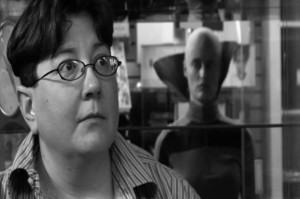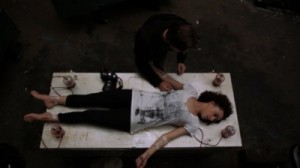By Kim Voynar Voynar@moviecitynews.com
Sundance Reviews: Vampire and Codependent Lesbian Space Alien Seeks Same
A lot of people here are Sundance are really down on Vampire, the latest film — and the first in the English language — by ultra-artsy Japanese writer/director Shunji Iwai. I am not quite as down on it as a lot of people I know, but let me tell you why.
First, Vampire is an ambitious, intelligent film that has an interesting idea at its core: Simon (Kevin Zegers) is a serial killer who thinks of himself more as a gentle angel of death for suicidal girls than a murderer.
The problem is that, rather than leaving space around this central idea to give the viewer room to ponder how they think about it, or to bring their own ideas into the interpreting, Iwai fills every conceivable space, often with characters or ideas that don’t feel as if they fit as a part of a cohesive whole. Characters and ideas are dropped into the mix with little or no context or purpose for being there, and as a result there are a good many moments in the film that feel contrived, and others that feel less developed than they should.
Simon’s not a vampire, not really. He’s just a guy who digs the taste of blood, who’s drawn to killing girls in this particular way, and in particular, he’s very invested in the idea that he is not a bad guy, but a good one. He’s helping these girls, not hurting them — even though he knows on the other hand that’s not exactly what you might call “objectively true.” That’s an interesting angle for a serial killer movie, this whole idea of combining the “willing victim” concept with a guy who’s fascinated by vampires and wants to drink blood, but doesn’t want to just kill indiscriminately.
The second problem — an extension of the first — is that the film is a good 30-35 minutes too long.
Iwai would have a much better film on his hands if he would cull it down to the core idea and characters, this serial killer and the girls he befriends through suicide chat rooms, who become his “victims.” The opening 15 minutes or so, with the terrific Keisha Castle-Hughes as the first of the suicidal girls we meet, is fantastic. A sequence later on between Simon and a suicide case named Ladybird (Adelaide Clemens) is equally well done. The relationship between Simon, who’s a high school biology teacher, and Mina, a suicidal Japanese exchange student in his class, is also intriguing. And the final sequence between Simon and Maria Lucas (Krisin Kreuk), apparently the first girl he “helps,” is also engaging and well done.
Pretty much everything else? Needs to be gone.
And yet — and I know I might be the lone voice in the wilderness on this one — I’m not going to completely pan Vampire, because it’s so evident that the filmmaker had a vision, and was reaching here to do something different and engaging and highly visual. Visuals, actually, are used throughout the film as an integral part of the storytelling; much of the film plays almost like an extended music video, or trippy video art installation.
There’s something that didn’t quite work for me about Zegers in the lead role, though. It’s not that he does anything wrong, exactly … more just that he doesn’t feel quite right. I think I’d rather have seen maybe Joseph Gordon Levitt, or Jason Ritter, or even someone with a completely different look that can play as both innocent and somewhat sinister, like Lukas Haas.
There’s a good film lurking within the frames of Vampire, it’s just largely being buried right now by too much superfluous material that takes away from what it could be. Cut out those unnecessary bits, tighten up the story and the focus, though, and you’d have a pretty interesting film with some great use of visuals and music.
______________________________________________
Co-Dependent Lesbian Space Alien Seeks Same
 Pretty much exactly what you think it would be from the title. Three lesbian aliens are sent to Earth to have their hearts broken by humans, because their capacity to love is so huge it’s destroying the ozone layer on their planet. No, I’m not making that up.
Pretty much exactly what you think it would be from the title. Three lesbian aliens are sent to Earth to have their hearts broken by humans, because their capacity to love is so huge it’s destroying the ozone layer on their planet. No, I’m not making that up.
One falls in love with Jane, a lonely stationery store clerk, and the other two fall for each other over cheesecake. There’s also a pair of “Men in Black”-types running about keeping an eye on the aliens. That’s pretty much the extent of the plot.
It’s obvious that the filmmaker, Madeleine Olnek, very much wishes to evoke deliberate cheesiness ala Ed Wood or Roger Corman, and in this she largely succeeds. The special effects are actually somewhat amusing (think: cheap plastic cups made into “space” earphones and a spaceship that looks like a Jiffy Pop popcorn pan), the acting deliberately wooden. It’s shot in black and white, and the laughable lameness of the props aside, it’s actually shot quite well in a way that does capture the old B-Movie vibe.
Unfortunately, Co-Dependent Lesbian Space Alien Seeks Same wants to be so bad it’s good, but instead ends up being so bad that, apart from a few moments here and there, it’s mostly just boring. A pity, because I really wanted it to be bad in a good way.
















